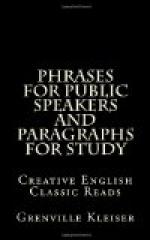From “Speech in Behalf of Blockdale.”
* * * * *
But let it now for argument’s sake be admitted, saving always the reputation of honorable men who are not here to defend themselves—let it, I say, for argument’s sake, be admitted that the gentlemen alluded to acted under the influence of improper motives. What then? Is a law that has received the varied assent required by the Constitution and is clothed with all the needful formalities thereby invalidated? Can you impair its force by impeaching the motives of any member who voted for it? Gouverneur Morris.
From “Speech on the Judiciary.”
* * * * * Let us pause, sir, before we give an answer to this question. The fate of us, the fate of millions now alive, the fate of millions yet unborn, depend upon the answer. Let it be the result of calmness and intrepidity; let it be dictated by the principles of loyalty and the principles of liberty. Let it be such as never, in the worst events, to give us reason to reproach ourselves, or others reason to reproach us, for having done too much or too little. James Wilson.
From “Vindication of the Colonies.”
* * * * *
It is impossible to deny the facts, which were so glaring at the time. It is a painful thing to me, sir, to be obliged to go back to these unfortunate periods of the history of this war and of the conduct of this country; but I am forced to the task by the use which has been made of the atrocities of the French as an argument against negotiation. I think I have said enough to prove that if the French have been guilty we have not been innocent. Nothing but determined incredulity can make us deaf and blind to our own acts, when we are so ready to yield an assent to all the reproaches which are thrown out on the enemy, and upon which reproaches we are gravely told to continue the war. Charles James Fox.
From “On the Rejection of Bonaparte’s Overtures.”
* * * * *
Now I think the people ought not to be made to wait for the relief they have a right to demand. They ought not to be made to suffer while we argue one another out of the recorded and inveterate opinions of our whole lives. I say, therefore, for myself, that, anxious to afford them all the relief which they require, regretting that the state of opinion around me puts it out of my power to afford that relief in the form I might prefer. I accommodate myself to my position, and make haste to do all that I can by the shortest way that I can. Consider how much better it is to relieve them to some substantial extent by this means, at once, than not to relieve at all, than not to initiate a system or measure of relief at all, and then go home at the end of this session of Congress, weak and weary, and spend the autumn in trying to persuade them that it was the fault of some of our own friends that nothing was done. How poor a compensation for wrongs to the people will be the victories over our friends! Rufus Choate.




